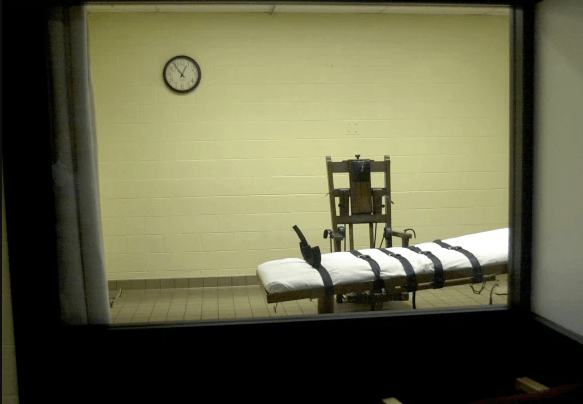Cruel and Unusual Punishment - The State Sanctioned Killing of Joe Nathan James
Alabama Department of Corrections under fire for the three-hour unexplained time gap between scheduled execution and time of death

TW: execution, death, autopsy
In 1994, Joe Nathan James Jr. murdered Faith Hall, a mother of two he had formerly dated. In 1999, he was sentenced to death in Jefferson County, Alabama. The Alabama Court of Criminal Appeals upheld the conviction in 2010, and the US 11th Circuit Court of Appeals upheld it again in 2020. James was executed on July 28th, 2020, at the Holman Correctional Facility in Atmore, Alabama.
Pleas for clemency included the family of Faith Hall. In the months prior to James’s execution, Faith Hall’s brother Helvetius and her two daughters, Terrlyn and Toni, lobbied Governor Kay Ivey to spare the man’s life, repeatedly stating that they had forgiven James and had no desire to see him killed. "I just feel like we can't play God. We can't take a life. And it's not going to bring my mom back,” Terryln Hall said in an interview with the Associated Press before James’ execution.
Governor Ivey turned aside the wishes of the family and ordered the execution to proceed. The family chose not to attend, but released a statement instead. “We hoped the state wouldn’t take a life simply because a life was taken and we have forgiven Mr. Joe Nathan James Jr. for his atrocities toward our family,” they wrote.
James’ execution began shortly after 9 p.m., three hours after he was scheduled to be executed. Alabama Department of Corrections officials later said the delay was caused by issues establishing an intravenous line to administer the lethal injection to James. However, journalists at the execution noted that James appeared to be unconscious before the execution process began, and when pressed on both the delay and James' lack of responsiveness in the execution chamber, John Hamm, the corrections department commissioner, said, that he couldn’t “overemphasize this process. We’re carrying out the ultimate punishment, the execution of an inmate. And we have protocols and we’re very deliberate in our process, and making sure everything goes according to plan. So if that takes a few minutes or a few hours, that’s what we do.”
After continued questioning, eventually the Alabama DOC conceded that it could not confirm whether James had been “fully conscious” during the lethal-injection procedure, though it assured journalists that he had not been sedated.
Jim Ransom, James' defense attorney, was alarmed when he heard that his client hadn’t responded to the warden’s prompt to offer his last words. “I had my suspicions about the time lapse,” Ransom explained, “and I feel like the state needs to be held accountable when they mess up.”
Ransom discussed the case with pathologist Joel Zivot to pursue an independent autopsy, and secured permission from James' brother Hakim. A brief glimpse into the findings:
"James, it appeared, had suffered a long death. The state seems to have attempted to insert IV catheters into each of his hands just above the knuckles, resulting in broad smears of violet bruising. Then it looked as though the execution team had tried again, forcing needles into each of his wrists, with the same bleeding beneath the skin and the same indigo mottling around the puncture wounds. On the inside of James’s left arm, another puncture site, another pool of deep bruising, and then, a scant distance above, a strange, jagged incision, at James’s inner elbow. The laceration met another cut at an obtuse angle. That longer, narrower slice was part of a parallel pair, which matched a fainter, shallower set of parallel cuts. Underneath the mutilated portion of James’s arm was what appeared to be yet another puncture—a noticeable crimson pinprick in the center of a radiating blue-green bruise."
The Alabama DOC's lack of transparency and the findings of the independent autopsy prompted Yvette Craig, James' sister, is calling for an investigation into the actions state officials took in the hours before he was put to death. Craig fears what happened to her brother during that three hour delay. “Only the ADOC employees know what occurred during those three hours,” she wrote. “… At the very least, [ADOC Commissioner John Hamm] should have let the execution warrant expire and revisit the method of execution.”
The execution of James is not the first time the Alabama DOC botched an execution. The 2018 execution of Doyle Lee Hamm was called off after corrections staff were unable to establish an IV line. Staff punctured Hamm at least 11 times in his limbs and groin, causing him to bleed profusely on the gurney.
In an article for The Atlantic, assistant federal defender John Palombi said “The details of the torture inflicted on Joe James are tragic, but unfortunately no surprise to anyone who has had a client executed in Alabama with lethal injection. Adding to the torture is the refusal of the Alabama Department of Corrections to admit or accurately discuss the issues with Mr. James’ execution … There should be an immediate moratorium on all executions in the state of Alabama until a thorough investigation of Alabama’s execution process, done by people outside the Department of Corrections, is complete.”
Read the full article "What Happened to Joe Nathan James?" in The Atlantic.










